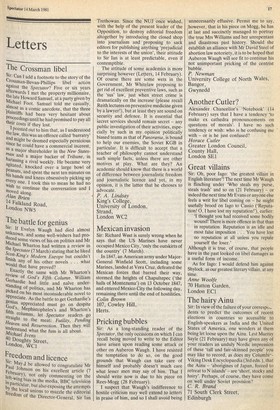The battle for genius
Sir: If Evelyn Waugh had died almost unknown, and some well-wishers had produced some views of his on politics and Mr Michael Wharton had written a review in the Spectator (7 March) stating that he liked Scott-King's Modern Europe but couldn't finish any of his other novels . . what would that have proved? Exactly the same with Mr Wharton's review of God's Fifth Column. William Gerhardie had little and naive understanding of politics, and Mr Wharton has Picked on his most inconsiderable novel to appreciate. As the battle to get Gerhardie's genius appreciated must go on despite God's, Mephistopheles's and Wharton's fifth columns, let Spectator readers go straight to the meat: Futility, Pending Heaven and Resurrection. Then they will understand what the fuss is all about.
Michael Ivens 40 Doughty Street, London, WC1
Freedom and licence
Sir: May41 be allowed to congratulate Mr Paul Johnson on his excellent article (7 February), not only commenting on the left-wing bias in the media, BBC television in particular, but also exposing the attempts by the local unions to muzzle the editorial freedom of the Director-General , Sir Ian Trethowan. Since the NUJ once wished, with the help of the present leader of the Opposition, to destroy editorial freedom altogether by introducing the closed shop into journalism and proposing to sack editors for publishing anything 'prejudicial to the interests of the union', their attitude to Sir Ian is at least predictable, even if contemptible.
The attitude of some academics is more surprising however (Letters, 14 February). Of course there are some wets in the Government, Mr Whitelaw proposing to get rid of excellent preventive laws, such as the 'sus' law, just when street crime is dramatically on the increase (please recall Reith lectures on preventive medicine given by a lawyer!), but at least they are sound on security and defence. It is essential that iecret services should remain secret — any public investigation of their activities, especially by such in my opinion politically biased teams as that of Panorama, is bound to help our enemies, the Soviet KGB in particular. It is difficult to accept that a teacher of philosophy cannot understand such simple facts, unless there are other motives at play. What are they? An academic should know that there is a world of difference between journalistic freedom and journalistic licence and yet, in my opinion, it is the latter that he chooses to advocate.
P. A. Lindsay King's College, University of London, Strand, London WC2






































 Previous page
Previous page